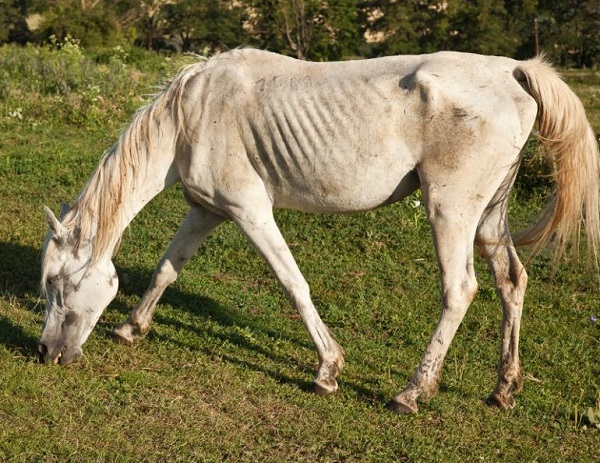
A common problem among horses is chronic inflammatory disease that can cause weight loss. These horses are the ones that continue to eat normally and are on a good quality ration but still lose weight. Chronic inflammatory disease can affect any body system and cause weight loss. One of the most common causes of chronic inflammatory disease is intestinal parasites and although you may be deworming your horse routinely, your horse can develop a larval intestinal infection that does not respond to regular dewormers. Some of these horses require a special deworming program to kill these larval parasites.
Horses with chronic lameness will lose weight. This is common in older horses with arthritis, but I also see this in many horses that may be slightly lame from a previous case of founder. Actually, any horse that is experiencing chronic pain will also lose weight. Disease of many different organ systems can cause weight loss. Heart failure, especially if related to infection of the heart valves, can cause weight loss and a cardiac ultrasound exam is required for diagnosis of this condition. Some horses also have chronic inflammation in their lungs called heaves that leads to difficulty breathing and these horses also commonly lose weight. In older horses with weight loss, neoplastic disease or cancer is a major concern. Cancer that affects the liver, intestinal tract, or lungs are the most common areas involved in horses. If you have a horse that is losing weight but is otherwise normal, contact your equine veterinarian.
Dr. Bob Judd, DVM and the Texas Farm Bureau
Did You Know
There are 20,000 species of bees.
Bees are found on every continent except Antarctica.
Bees are social creatures and live in a hive with a queen bee.
In one year, a colony of bees eats between 120-200 pounds of honey. Honeybees use nectar to make honey. They are the only insects that produce food (honey) for humans.
The average beehive contains 50,000 bees.
A female rat can mate as many as 500 times with various males during a six-hour period of receptivity, a state she experiences about 15 times per year. Thus, a pair of brown rats can produce as many as 2,000 descendants in a year if left to breed unchecked.
An average rat’s life span is two to three years.
Chickens can’t swallow when they are upside down.
Melbourne, Australia has an 8:00 pm curfew for cats.
Houseflies hum in the key of E.
Cats have no collarbones.
Ostriches can swim.
Rabbits can run faster than cats – up to 35 mph. They have eyes on the side of their heads that allow almost 180-degree vision.
Rabbits can weigh between 2 and 11 pounds.
There are more than 45 breeds of rabbit.
Related Articles & Free Email Newsletter Sign Up
5 Things to Consider Before Adopting a Rescue Horse
Morgan Horses are Gentle Giants and Versatile Athletes
Quarter Horses Offer Versatility and are Great for All Levels of Riders




Comment here